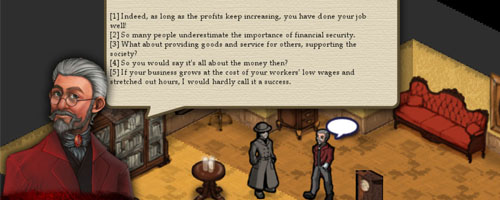
Working on my second game, I realize the dialogue writing approach from my first game Postmortem: one must die may not quite cut it.
My Old Approach
With my first game, I used long, unskippable branches of dialogue with strategic key beats to ensure necessary information was conveyed and the player was forced to influence the characters, even if unwittingly.

While it worked great in a a much smaller and less story-driven Postmortem, it does not scale well as more variables affect the dialogue, and was criticized for not being able to get out of a boring conversations.
Problem of Variables
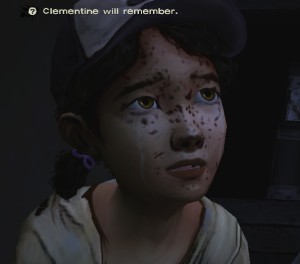
With my next game having many more variable that can influence the dialogue, it is difficult to convey their impact on the conversation, and how the player can leverage that. Currently a conversation is affected by:
- Point in story
- Circumstances (i.e. player initiated vs. confronting trespassing player)
- How much an NPC likes you
- How drunk an NPC is
- How suspiciously you have acted
- What clues you have uncovered
- What/how you talked to them before
A lot of it can be easily lost on the player. One solution I have been using is having subtle hints like “I like you so…” or “look how drank I am *hiccup*”. Or maybe show messages “this character likes you more now”, similar to Walking Dead’s “Clementine will remember this” messages?
Problem of Experimentation
Secondly, deep dialogue branches don’t leave room for experimentation with variables. For instance, you can try getting NPCs drunk to get more out of them, but you can’t do it if you have already ran through the really long dialogue branch. The chance to try a different approach is not only lost, but worse yet, you wouldn’t even know different approaches existed.
While interesting and realistic, it doesn’t make for a good game. What is the point of crafting all the complex systems and variables if the player isn’t aware of them, or can’t leverage them? At that point, I might as well cut them all out and just write a linear narrative – and to the player, the experience would be the same.
And before anyone throws the replayability hat – one thing I learned with Postmortem is that players prefer gameplay-replayability much more than narrative one. Even big story-driven games like Walkind Dead, Witcher or Mass Effect don’t really get replayed much for the story. And why would they, if you can more easily watch a Lets Play or read a FAQ to see what you missed?
Problem of Consequences
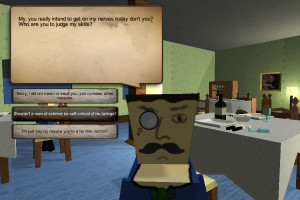
Designing long branches that account for all (or a good number of) these factors is challenging if you want them to be meaningful and not just cosmetic. It’s a very common problem in many RPGs which feel like your choices don’t matter (cue the rage over Mass Effect ending). Even Walking Dead pulled a believable smoke and mirrors – when you think about it, the story never really strayed from its predefined path.
I actually just ran this while writing one conversation, and dubbed it the Dick Dilemma: an NPC who the player can insult enough to stop talking to him, yet whose cooperation is crucial for one of the main plotlines. Do I just realistically cut that quest off, a consequence of your actions? Or perhaps require some additional work to earn the NPCs trust? Or maybe create a dynamic of mutually-hateful yet necessary-by-circumstances cooperation?
While I do find the idea of blocking of an entire plot arch intriguing, I feel it would be frustrating to the player, especially if it is done on accident or before the player ever realizes he will need the NPC later on. And not being a big tripe-A dev with a huge budget, I (sadly) need to consider just how much risky experimentation I can afford in my next title
Problem of Continuity
Having a deep dialogue branch creates a host of issues if you want to enable the player to break out of it at some point:
Allow the player to quit at any time and resume where they left later
- Creates a weird and jarring experience, for instance, if quit in middle of a heated argument.
- The player may not even remember what the conversation was about upon return.
- May cause gameplay/narrative “bugs” due to player knowing half-facts or unexpected combinations of dialogue variables
Being able to restart the branch
- Inherently illogical and anti-narrative (you don’t usually get a restart option in real life)
- Encourages “cheating” by replaying the same convo multiple times to discover the best path (moreso than game save/load)
- Unexpected compounding effects like a response that annoys or influences an NPC (somewhat fixable by not implementing the effect until branch end)
It doesn’t seem like there really is any elegant way of breaking out of long conversation branches. In either approach, you would have to be very careful in your conversation design and potentially have to make some narrative sacrifices to make it work. And even so, the player may forget he left a branch unanswered and still risk missing key information without a good way of letting them know how to obtain it.
Short Branches, then?
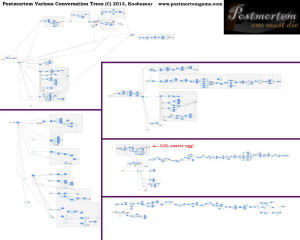
An idea I am considering is changing from deep to broad – having many more branches but of shorter lengths, focused on just one point at a time.
Pros:
- Open more dialogue options in right circumstances (i.e. if drunk, or suspicious of the player)
- Make consequences of dialogue more manageable (shorter dialogue = more focused = easier to narrow down influences/consequences)
- Allow for more re-playing branches for experimentation (shorter branch = less variables to track)
Cons:
- Less organic conversations; the feeling NPCs are talking signposts to be questioned
- Not much room for complex debates (like in Postmortem)
Conclusion
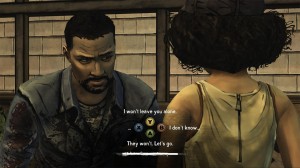
I definitely want complex dialogue with meaningful consequences, but also allowing some experimentation and trying different approaches. Relying on long branches solves the first problem at the cost of the second, while relying on short branches does the opposite.
I am still not sure if even thinking in terms of branches is the right way. But for the time being, I think I will attempt a hybrid approach with some very key, plot specific branches to ensure things are moving smoothly, with many shorter and re-doable side branches to allow some fun with the side or non plot-critical questlines.
I also want to add multiple conversation entry points triggered in different circumstances. For instance, confronting the player when spotted trespassing, or randomly striking up a conversation if on good terms with the player etc. This could alleviate the “walking signpost” and bring more life into the NPCs.
Oh the possibilities… I’m not really sure how this game is going to pan out, but I can already tell, it’s going to be an interesting experience.
Intrigued? PLAY KARASKI NOW!
Or Follow at 

Karaski: What Goes Up... is a an open-ended "Who-Dun-It" mystery adventure onboard a sabotaged 1920s Airship where the player is as likely a culrpit as the suspects. Deus Ex meets Clue with a bit of Telltale!
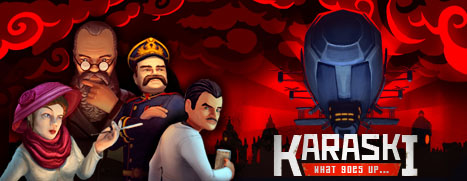
For what it’s worth, I never liked the “X will remember this.” thing. I feel like all it does is tell me that most things I’m doing aren’t having any effect. Even if it’s not true, I like to at least pretend I’m having an impact on the world or characters.
As for crafting complex systems and variables the player isn’t aware of, as Futurama put it, “When you do things right, people won’t be sure you’ve done anything at all.” It’s only after you’ve finished a game like this and are talking to other people or reading about it and you think “Wow, I never knew that could happen!” or “I never even thought about approaching the situation that way.” It’s more impressive to build a deep world that seems like a linear path than a linear path trying to feel like a deep world.